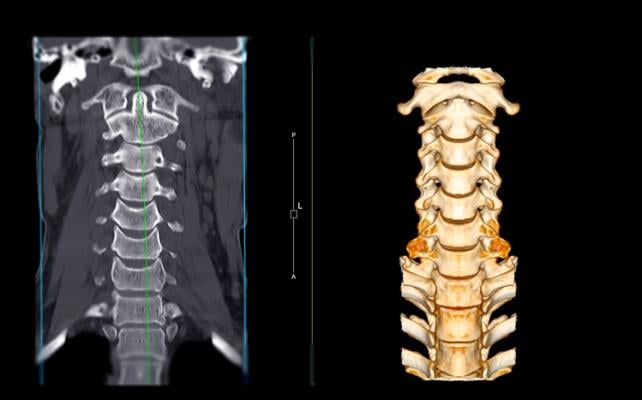
July 29, 2022 — The Radiological Society of North America (RSNA), in collaboration with the American Society of Neuroradiology (ASNR) and the American Society of Spine Radiology (ASSR), has launched the “RSNA Cervical Spine Fracture AI Challenge” to explore whether artificial intelligence (AI) can be used to aid in the detection and localization of cervical spine injuries.
The international imaging dataset being compiled and curated for the challenge is one of the largest and most diverse of its kind, including detailed clinical labels, radiologist annotations and segmentations.
“A unique aspect of this year’s RSNA AI Challenge is the great diversity of data,” said Errol Colak, M.D., FRCPC, assistant professor in the Department of Medical Imaging at University of Toronto in Ontario, Canada. “Our team has compiled a large dataset of cervical spine CTs from 12 institutions in nine countries across six different continents. Moreover, this year’s competition will introduce data annotated in multiple ways including examination level labels, vertebral body segmentation and image level bounding boxes.”
Over a million vertebral fractures and over 17,000 spinal cord injuries occur annually in the United States. The most common site of spine fracture is the cervical spine, located in the neck. Elderly populations are particularly vulnerable, and fractures can be more difficult to detect on imaging due to superimposed degenerative disease and osteoporosis.
Imaging diagnosis of adult spine fractures is now almost exclusively performed with computed tomography (CT) instead of X-rays. Quickly detecting the location of any vertebral fractures is essential to prevent neurologic deterioration and paralysis after trauma. Researchers hope that AI can assist in expeditiously identifying and localizing fractures.
To create the ground truth dataset, the challenge planning task force collected imaging data sourced from 12 sites on six continents, including more than 1,400 CT exams with diagnosed cervical spine fractures, and an approximately equal number of negative exams. Spine radiology specialists from the ASNR and ASSR provided expert image level annotations these images to indicate the presence, vertebral level and location of any cervical spine fractures.
For the challenge competition, contestants will try to develop machine learning models that match the radiologists’ performance in detecting and localizing fractures within the seven vertebrae that comprise the cervical spine.
“The machine learning models that are developed as part of this challenge may help advance patient care by assisting radiologists and other physicians in detecting fractures, which can be a difficult task,” Colak said. “These models may be of particular value in underserviced areas with limited access to expert neuroradiologists. Furthermore, these models can help patient care by prioritizing positive CT scans for radiologist review in high volume clinical settings.”
The RSNA Cervical Spine Fracture AI Challenge is being conducted on a platform provided by Kaggle, Inc., and is open to everyone. The competition phase will finish in October. The top 10 performing competitors will be awarded a total of $30,000.
Winners will be recognized in the AI Showcase during RSNA’s 108th Scientific Assembly and Annual Meeting at McCormick Place Chicago (RSNA 2022, Nov. 27 – Dec. 1).
For more information on the challenge, visit RSNA.org/AI-image-challenge


 February 13, 2026
February 13, 2026 









